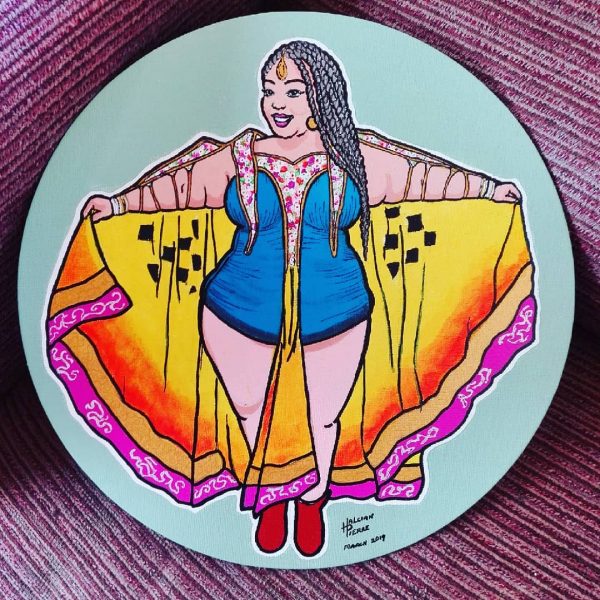
In honour of Global Voices’ 15th birthday, we continue our recap of some of this year's most compelling coming-of-age posts from the Caribbean.
In this instalment, we'll take a look at some of the stories coming out of the region that affect women and how they operate within the Caribbean space.
Trinidad & Tobago Carnival's ‘Moko Jumbie’ mother

On the southern edge of Port of Spain, while waiting for her band to cross the South Quay judging point on Carnival Tuesday, 2019 Trinidad and Tobago Queen of Carnival Shynel Brizan breastfeeds her son Prince. Photo by Shaun Rambaran, used with permission.
In 2019, perhaps the most iconic image of Trinidad and Tobago's annual Carnival celebrations was a serene stilt walker — a traditional Carnival character known as a ‘Moko Jumbie’ — who sat amidst the festivities bonding with her infant son as she breastfed him.
Shynel Brizan, fresh off her victory of copping the coveted Queen of Carnival title, was part of a band of Moko Jumbies comprising a stunning portrayal titled “Palace of the Peacock”, which impressed many Carnival enthusiasts — but the image of Brizan breastfeeding, captured by several photographers on the scene, proved to be even more powerful, quickly making its way around the world. The image was shared a number of times on social media, including by The Breastfeeding Association of Trinidad and Tobago and by La Leche League USA.
In a piece titled “Moko – Mother —Marvel”, Brizan told blogger Sheetal Daswani, “The stilts and I become one when I’m a Moko, and when I’m feeding my son, he and I also become one. The experiences are similarly spiritual.” It was a refreshing perspective, especially when juxtaposed against lactation consultant Marilyn Stollmeyer's observation that, “Particularly at Carnival, we're a society that says it's okay to put on skimpy costumes and bare your breasts, but if women are breastfeeding, many times they are asked to cover up or go somewhere else.”
Or, as Daswani put it, “Shynel’s images assert the legitimacy of public breastfeeding, and her audience acknowledges the exposure of her body and has normalized it, the same way they normalize all women playing mas despite their level of self-exposure. These photos have presented an unintended aesthetic strategy to put forth a profound proclamation for all women — We own our bodies.”
Body-shaming gets the boot

Artist Halcian Pierre's portrait of plus-size Carnival masquerader Candice Santana, used with permission.
Carnival also proved to be the perfect vehicle through which to address the issue of body-shaming. Although there is a website that has been advocating for inclusivity and diversity in Caribbean Carnivals for some time now, the body-shaming bent was put front and centre after Trinidad and Tobago's former Minister of Health posted a video chastising plus-size masquerader Candice Santana.
Santana had shared photos of herself in her Carnival costume, commending the band she played with for running “a campaign endorsing all sizes, shapes and shades”:
This excited me on many levels because truth be told we are a body shaming society. Some do it consciously and directly while others may not even understand that they doing it.
Former minister Fuad Khan retorted that the issue was one of health, then proceeded to verbally humiliate Santana, referring to her as “a tub”. When social media users rallied predominantly on the side of Santana, Khan apologised for his tone but stood by his message.
For many Caribbean women, however, Santana's message was stronger:
I recall that I spoke about body shaming regardless of size, shape or shade. I also recall that I said that I am not endorsing an unhealthy lifestyle […] I look myself in the mirror and remind myself that I am beautiful inside and outside.
Jamaica tackles period poverty

Shelly-Ann Weeks talks about female reproductive health at an event at the Institute of Jamaica in March 2019. Photo courtesy of Her Flow Foundation.
Imagine having to make a menstrual pad last five days. Sadly, this is the reality for many Caribbean women and girls on the lower side of the socioeconomic scale — so Jamaican author and columnist Shelly-Ann Weeks decided to put both mainstream and digital media to good use in order to focus the spotlight on traditionally taboo topics like “period poverty”.
As the executive director of Her Flow Foundation, which address the stigma and shame often associated with menstruation, Weeks established Jamaica's first Period Awareness Day, which took place in October 2016, as well as Period Awareness Week, held in October 2017. By November 2018, the first Healthy Pelvis Conference had been held in the capital, Kingston.
These initiatives, along with regular awareness workshops that have reached over 5,000 high school students — both boys and girls — has begun to make a dent in how female reproductive health is regarded in the country, and dispel the “hush-hush” attitude to female reproductive health that Weeks calls “dangerous”.
Weeks has long recognised that the issue is just as much about long-held societal attitudes, religious beliefs and cultural myths as it is about economic status:
Talking to women while I was writing my first book, I realised so many have problems affording the products they need every month. And for the woman who has daughters, she literally has to choose between buying them pads and feeding them […] the need is much greater than I had thought. I wanted to create a space where women could get access to pads free of cost, no questions asked. Because it’s a dignity issue as well.
Part 1 of this series is here.






